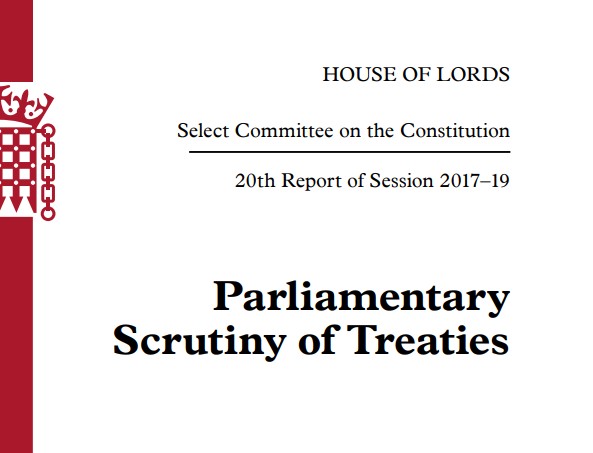The inquiry into the parliamentary scrutiny of treaties was launched to investigate Parliament’s current role in treaty scrutiny and how its efficacy compares with mechanisms of treaty scrutiny in other countries’ parliaments, as well as considering how and when Parliament should scrutinise the handling of treaties after Brexit.
The cited evidence looked at current UK treaty oversight, stating that the UK Parliament is less involved in treaty oversight than other parliaments, and that the lack of structures or processes for scrutinising the Government’s treaty actions are a “a constitutional problem that is serious enough to require reform” and could undermine future treaty negotiation.
It suggested practicable mechanisms for parliamentary scrutiny to address the current limitations, such as the creation of a dedicated Parliamentary Treaty Committee, supported by an expert secretariat.
Referencing the submitted evidence on numerous occasions, the House of Lords Constitution Committee report calls for “urgent reform to strengthen Parliament's scrutiny of treaties” and declares its recommendation for the establishment of a new treaty scrutiny committee.
Chairman of the Constitution Committee Baroness Taylor of Bolton said:
"The current processes for Parliament to scrutinise treaties are limited and flawed. Parliament needs more power and better structures to hold the Government to account for its treaty actions.
"The creation of a treaty committee would provide Parliament for the first time with an effective mechanism to scrutinise treaties. This reform is required irrespective of Brexit, however there is a pressing need for change as it is likely that the UK’s departure from the European Union will lead to the Government negotiating more and broader treaties than in the past."
The written evidence drew on the outcomes of a conference on Treaties, Brexit and the Constitution - co-organised by Professor Eirik Bjorge, Arabella Lang and Dr Ewan Smith in 2018, which tackled the foreseeable treaty problems posed by the Brexit process, submitted as evidence in 2018 - as well as written and oral evidence variously submitted to a number of parliamentary committees over the past year.
Ultimately, the evidence states, “[t]he goal is not for Parliament to place obstacles in the path of Government treaty policy, but to foster a constructive working relationship where Parliament and Government work together to achieve effective treaty actions.”
